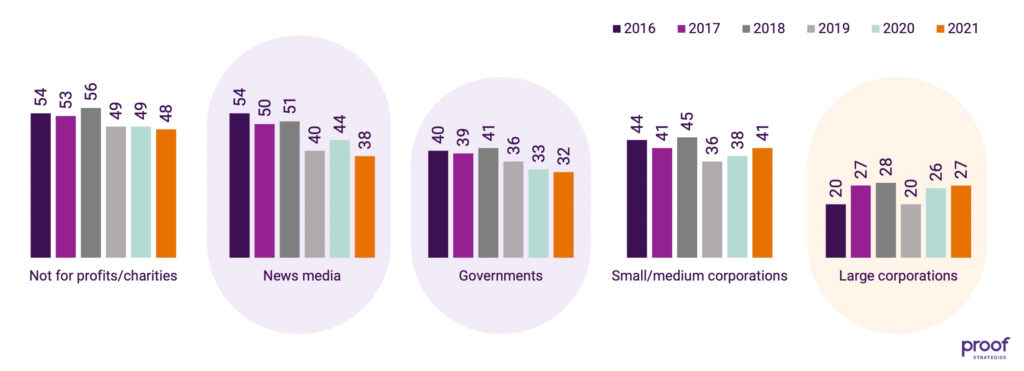(March 14, 2022) While public trust in Canada has been deteriorating since the first CanTrust study in 2016, between January 2021 and January 2022, there was a 10% drop in the number of Canadians who expressed positive trust in Canadian institutions and government.
As of January 2022, only one third (34%) of Canadians expressed positive public trust, down from 45% in 2018. The sharp decline is explained using the “mistrust variant,” referring to a downward trend in trust stemming from anxiety and hardship related to the COVID-19 pandemic. Media, business interests, NGOs, and government continue to lose “aggregate trust” in a way so tied to the pandemic that “[i]respondents reported that [when] their pandemic stress and anxiety had gone away, their trust levels also went back to normal. If they reported continued stress and anxiety, their trust levels [lowered]”. Those Canadians who had never felt pandemic-related stress were the least trusting in general, and those born in Canada were less trusting than those who were born elsewhere.
Improving public trust in the workplace needs serious work, the study reveals. Overall, employees give employers a D grade for their ability to build trust, down from a C- in January 2020.
And in a year where the subject of racism and equity have come to the forefront of our social debate, “69% of Canadians identify individual citizens as the most important group to help address the issues in a way that is consistent with Canadian values, followed by the federal government at 67% and provincial governments at 66%. Charities and private business are each seen as important at 56%.”
Nonprofits and charities showed no sign of increasing trust since they suffered a precipitous 7% loss in 2018. Less than half of Canadians expressed trust them (48%) in 2021.

Ultimately, the study foregrounded the importance of trust-building for future demands, like those of climate change. Most trusted were Indigenous leaders and the Canadian Red Cross. Interesting, given that most Canadians have not experienced direct help from the Canadian Red Cross (and we are only decades away from the tainted blood scandal of the 1980s when the Red Cross was stripped of its blood donations services) and may only know the organization from the news and fundraising campaigns. Facebook, on the other hand, was the least trusted corporation; 83% of Canadians have a Facebook account, and use it regularly. Growing accustomed to ethical compromises like this may have helped to erode public trust in general. It is hard to say when and how these downward trends will reverse but clearing skies for the pandemic may help.
The CanTrust Index is a yearly study, undertaken by Proof Strategies to determine the level of trust that Canadians have in various branches of organized society, such as government, business, medicine, and fellow citizens. This year’s study used data from 1536 people (with a ‘special sample’ of lower-income Canadians). The data was collected by the Logit Group and processed by Proof Strategies.
Related reading
In latest poll, charities rank last in trust to mitigate inequity February 12, 2021
Lack of trust in institutions creating information bankruptcy: Edelman PR January 29, 2021
Canadian’s trust in charities has dropped 6% since May September 9, 2020